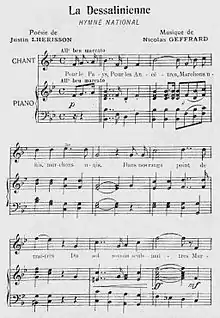| English: The Song of Dessalines | |
|---|---|
 | |
National anthem of Haiti | |
| Lyrics | Justin Lhérisson, 1903 |
| Music | Nicolas Geffrard, 1903 |
| Adopted | January 1, 1904 |
| Audio sample | |
U.S. Navy Band instrumental version (one verse)
| |
"La Dessalinienne" (French pronunciation: [la dɛs.salinjɛn]; Haitian Creole: "Desalinyèn"; English: "The Dessalines Song") is the national anthem of Haiti. This march was written by Justin Lhérisson and composed by Nicolas Geffrard.[1][2]
Etymology
"La Dessalinienne" is named in honor of Haiti's revolutionary leader and first ruler Jean-Jacques Dessalines.[3] The title was suggested by historian Clément Lanier.[4]
History
To commemorate the 100th anniversary of the Haitian Revolution, a competition was held for a national anthem in 1903. The poetic words of Justin Lhérisson and martial composition of Nicolas Geffrard won over the judges,[5] who preferred it to "L'Artibonitienne" by Capois diplomat Louis Edouard Pouget.[4]
The anthem was premiered at an October 1903 celebration of the Armée Indigène's entry into Port-au-Prince organised by the Association du Petit Théâtre.[4] It was sung by Auguste de Pradines, also known as Kandjo.[6]: 47 The text and music were printed at Bernard's in Port-au-Prince and distributed throughout the country during the week.[4] It was officially adopted as the national anthem in 1904.[5]
Lyrics
As a one-verse rendition can be relatively short, a common way to lengthen a performance is to perform an abridged arrangement consisting of the first verse immediately followed by the last.[1]
French lyrics
| French lyrics (official)[7][8] | English translation |
|---|---|
I |
I |
Haitian Creole lyrics
A Haitian Creole version was created by Raymond A. Moise, and Haitian singer Ansy Dérose (1934–1998) helped popularize it in 1980. Although it became widely accepted, it is not official.[1][9]
| Haitian Creole lyrics (unofficial)[9][10][11] | IPA transcription[lower-alpha 1] | English translation |
|---|---|---|
I |
1 |
I |
See also
Notes
References
- 1 2 3 "Haitian Patriotic Songs". Archived from the original on 2013-12-31. Retrieved 2014-02-05.
- ↑ Malena Kuss. Music in Latin America and the Caribbean: Volume 2 Performing the Caribbean Experience - An Encyclopedic History. The Universe of Music Inc. p. 260. ISBN 978-0-292-70951-5.
- ↑ Olsen, Dale A.; Sheehy, Daniel E. (2014). The Garland Handbook of Latin American Music. p. 139. ISBN 9780415961011. Retrieved 9 June 2015.
- 1 2 3 4 "6130.- Symboles d'Haiti: Hymne National » Haiti-Référence". Haiti-Référence (in French). Retrieved 2022-01-25.
- 1 2 Hall, Michael R. (2012). Historical Dictionary of Haiti. p. 182. ISBN 9780810878105. Retrieved 9 June 2015.
- ↑ Averill, Gage (1997). A day for the hunter, a day for the prey: Popular music and power in Haiti. Chicago, Ill.: University of Chicago Press. ISBN 9780226032931.
- ↑ "National Anthem". Embassy of Haiti. Retrieved 2022-01-25.
- ↑ Shaw, Martin; Coleman, Henry (1963). National Anthems of the World. Blandford Press. p. 160.
- 1 2 "6140.- Im nasyonal Dayiti » Haiti-Référence". Haiti-Référence (in French). Retrieved 2022-01-25.
- ↑ Bon nouvèl (in Haitian Creole). Lafalanj. 1980. p. 20.
- ↑ Savain, Roger E. (1995). Dis pa nan lang ayisyen-an (in French). Schenkman Books. p. 107. ISBN 978-0-87047-106-3.
- ↑ Pour que la mémoire--: Père de la Patrie, 20 septembre 1758-17 octobre 1806. Jean-Jacques Dessalines (in French). Editions des Presses Nationales d'Haïti. 2001. p. 6. ISBN 978-99935-37-08-3.
.svg.png.webp)